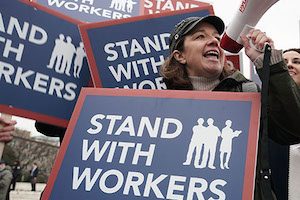
BILL FLETCHER JR: In a Supreme Court decision called Steele v. Louisville (and Nashville) Railroad, 1944, set the precedent for all future duty of fair representation cases. The court was very clear that a union, because it has exclusive representation rights, was obligated to represent fairly and equitably all workers in the bargaining unit irrespective of union membership, meaning that the union had to represent people who were nonunion. In the public sector, what happened over the years was that workers when employed, would not have to join the union. However, they would pay a fee, which is the agency fee or fair share fee that would cover the cost of representation. Whether the worker is in a union or not, the union has to represent them on any credible grievance. That means that they have to take it to arbitration if necessary, which can be very expensive. The union might have to litigate a matter in court, maybe something that has to be taken before a state legislature or city council.
All of this costs money. What the Supreme Court was saying was that, yes, we hear that, but it’s going to be up to the union. The union will have to use his own resources to pay for this because to ask a worker to pay their fair share is somehow an infringement on their freedom of speech. Now, the other part of this that is critical to emphasize is that being in a union does not in any way stop your freedom of speech. You can be a union member and not agree with unions. You can be a union member and oppose the leadership of the union. You can be in a union and oppose the stand, the political stand that the union takes. None of that is prohibited by being a union member. So, the whole notion that this was about free speech is nothing more than sophistry. It really was about crushing the power of organized workers. That’s what the decision was about.
BETWEEN THE LINES: What’s the likely fallout from the Supreme Court decision? We’ve heard predictions of the loss of hundreds of thousands of dues-paying workers, non-union members who could decide to opt out of paying their fair share fees. How much could this weaken the labor movement in the United States?
BILL FLETCHER JR: Well, there’s no question but that it could possibly weaken the unions because what you have to understand is open shop is what it’s called when workers don’t have to join the union or pay a fee called right to work in some states. What open shop does is that it appeals to greed and it’s really interesting because there’s no other institution in the United States that is obligated by law and with no governmental subsidy, is obligated to represent people who are not making a contribution. It would be as if the people of the city or town were given the option of paying tax, but they would be guaranteed fire police, sewer, water and education. That’s the equivalent. So that’s why it’s so completely ridiculous. So this will drain resources of unions. There’s no question about it.
BETWEEN THE LINES: With record inequality that we see in the United States, some of the worst rates of inequality anywhere in the world, in the industrialized nations and now with a burgeoning militant teachers’ union movement in a lot of unexpected places including Oklahoma, we have maybe an opportunity now during this Trump administration where they’ve gone full tilt in favor of corporations and against workers in decisions they make day after day, is there a potential here in the wake of this Supreme Court ruling that you’ll see a lot of new energy and militancy among the labor movement?
BILL FLETCHER JR: Tremendous potential, but there’s been potential for awhile. And so for example, you think about in 2011 with the Occupy movement, you think about the, Madison uprising and Wisconsin workers have demonstrated time and time again, a willingness to resist. The challenge however is that if you don’t have good organization and good leadership, what this becomes is a phenomena of periodic eruptions, but not a major insurrection. One of the things that I’ve been feeling for awhile is that we need to challenge the corporate right exactly where they least expect us to, which is insisting upon rights at work, not right to work, but rights at work. So one thing that I have been advocating for awhile is a necessity for unions and other economic justice organizations to be pushing around the country fights to bring about a democratization of the workplace rights at work, beginning with basic protection against unfair terminations. So there’s ways of turning this around, but we need the union movement to step up to the plate and act as a real fighting organization, or set of organizations, that’s not just looking out after its own members.




